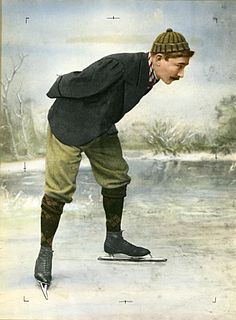
Short track speed skating is a form of competitive ice speed skating. In competitions, multiple skaters skate on an oval ice track with a length of 111.12 metres (364.6 ft). The rink itself is 60 metres (200 ft) long by 30 metres (98 ft) wide, which is the same size as an Olympic-sized figure skating rink and an international-sized ice hockey rink. Short track speed skating is the sister sport to long track speed skating and the cousin sport to inline speed skating.
The World Allround Speed Skating Championships are a series of speed skating events held annually to determine the best allround speed skater of the world. The event is held over two days, with all skaters entering the first three distances and the best eight skaters over these distances getting to ride the last event. The results of the races are converted to points, and the skater with lowest total score wins the championship.

Martina Sáblíková is a Czech speed skater, specializing in long track speed skating. She is an Olympic gold medal winner and a multiple European and World allround champion. She became the first Czech to win two Olympic gold medals at one Winter Games in the 2010 Olympiad. Sáblíková also competes in inline speed skating and road cycling races as a part of her summer preparation for the skating season. In cycling, she focuses especially on individual time trial discipline in which Sáblíková holds multiple Czech Republic National Championships titles and belongs to world's top 15 female time-trialists. Sáblíková is the elder sister of fellow speedskater Milan Sáblík.

The 2009 World Allround Speed Skating Championships were held at the indoor ice rink of the Vikingskipet Olympic Arena in Hamar (Norway) on 7 and 8 February 2009.

The 2010 World Allround Speed Skating Championships were held at the indoor ice rink of the Thialf in Heerenveen, Netherlands on 19, 20 and 21 March 2010.
The 2011–12 ISU Speed Skating World Cup, officially the Essent ISU World Cup Speed Skating 2011–2012, was a series of international speed skating competitions which ran the entire season. The season started on 18 November 2011 in Chelyabinsk, Russia, and ended on 11 March 2012 in Berlin, Germany. In total, seven competition weekends were held at six different locations, twelve cups were contested, and 72 races took place.

The 2014 World Allround Speed Skating Championships took place at the indoor ice rink of the Thialf arena in Heerenveen, Netherlands, on 22–23 March 2014.

The 1893 World Allround Speed Skating Championships took place at 13 and 14 January at the ice rink Museumplein in Amsterdam, the Netherlands. It is the fourth World Allround Speed Skating Championships organised at the Museumplein in Amsterdam.. It was the first official World Allround Speed Skating Championship after the foundation of the International Skating Union (ISU) in 1892. The Dutch skater Jaap Eden became the first official ISU-World allround by winning the 1500, 5000 en 500 meter. He did not need to finish the 10000m according to the rules. Oskar Fredriksen from Norway skated the championship the first World record at the 10000 meter.
The 3000 and 5000 meters distances for women in the 2012–13 ISU Speed Skating World Cup were contested over six races on six occasions, out of a total of nine World Cup occasions for the season, with the first occasion taking place in Heerenveen, Netherlands, on 16–18 November 2012, and the final occasion also taking place in Heerenveen on 8–10 March 2013.
The 3000 and 5000 meters distances for women in the 2013–14 ISU Speed Skating World Cup was contested over six races on six occasions, out of a total of six World Cup occasions for the season, with the first occasion taking place in Calgary, Alberta, Canada, on 8–10 November 2013, and the final occasion taking place in Heerenveen, Netherlands, on 14–16 March 2014. Five of the races were over 3000 metres, and one race was over 5000 metres.

The 2014 European Speed Skating Championships, officially the Essent ISU European Speed Skating Championships 2014, were held in Hamar, Norway, from 11 to 12 January 2014.
The 2014–15 ISU Speed Skating World Cup, officially the Essent ISU World Cup Speed Skating 2014–2015, was a series of international speed skating competitions that ran the entire season. The season started on 14 November 2014 in Obihiro, Japan, and ended with the final on 22 March 2015 in Erfurt, Germany. In total, seven competition weekends were held at six different locations, twelve cups were contested, and 80 races took place.

The 2013 European Speed Skating Championships was the 38th continental allround speed skating event for women and the 107th for men. The championships were held at the Thialf in Heerenveen, Netherlands, from 11 through 13 January 2013. Both the men's and women's championship consisted of four separate distance events and the winners are the skaters with the lowest points total after four distances. The competition was also a qualifying event for the 2013 World Allround Speed Skating Championships as the entry quotas were allocated according to the results of the European Championships. Sven Kramer and Ireen Wüst won the European titles.
The 2016 European Speed Skating Championships were held in Minsk, Belarus, from 9 to 10 January 2016. Skaters from 17 countries participated.
The 2016–17 ISU Speed Skating World Cup, officially the ISU World Cup Speed Skating 2016–2017, was a series of international speed skating competitions that ran the entire season. The season started on 11 November 2016 in Harbin, China, and ended with the final on 11 March 2017 in Stavanger, Norway.
The 2017 European Speed Skating Championships were held in Heerenveen, Netherlands, from 6 to 8 January 2017. Skaters from 12 countries participated. It was the first time that allround and sprint were held at the same time and venue.





